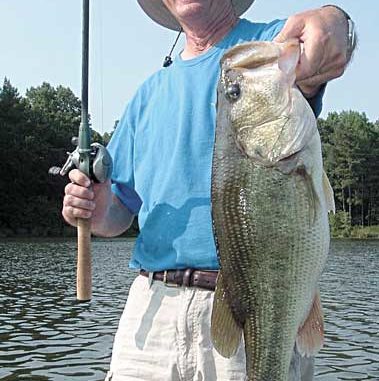
An angler recently asked this question — if you could pick out one thing that has helped you become a good fisherman, what would that be?
For me it’is definitely fishing small waters.
Small lakes are ideal places to learn and apply a base of knowledge to larger lakes. Whether ponds, small city reservoirs, or small streams, small waters can jumpstart your angling ability and more importantly, your angling intuition.
Out of curiosity, I called Dave Wolak of Wake Forest, an Elite Series pro bass angler, and posed the same question. Surprisingly, I got the same answer.
“Fishing small waters obviously puts things on a smaller scale, making your learning curve so much quicker,” he said. “The grand scale is minimalized, making the dominant pattern that much easier to identify.”
Through years of fishing these small water with success nearly every day you will begin to notice trends.
“One trend I see in small ponds is how (bass) gang up near the dams when the water is cold,” he said. “Apply that to a big lake, and you know to look at sharp-dropping hard-bottom areas like a channel bed or road bed under the same conditions.”
One of the most important aspects of being a successful fisherman is being able to identify the dominant pattern quickly. If you’ve got years of experience fishing small waters, your angling intuition develops.
What should the fish be doing? Intuition is important. The only way I know to be intuitive is to have a huge base of experience.
I know it’s not possible for everyone, but being on the water daily in all conditions is crucial to success down the road. Everyday during lunch or after junior high and high school, I was at a small Raleigh city lake. I kept a log of every day I went fishing. Today those patterns I noticed 15 years ago as a kid are still ingrained in my head.
When I’m having a tough day on tour, I think about that little lake and it’ll often give me ideas of how to improve.
Everyone wants to improve, including me. When I’m home from a tournament, I still go to ponds a few times a week. My wife might claim I go every day.
Nowadays I go mainly to test new techniques and lures, but I am still surprised by how bass react to some conditions.
For example, one September I fished my favorite pond during a tropical storm. Because of the windy, rainy conditions, I picked up spinnerbait and buzzbait and went around the whole pond with only one bass to show for it. I started to explore the center of the pond with a crankbait and caught them really well. Now on cloudy windy days, I know to try a little deeper water before I count out similar areas at a big lake.
Last but not least, ponds are a great place to add productive lures to your tackle box. Let’s face it, certain lures even of the same brand, style, and color outperform others.
I can discover these lures much faster and throw “heat” (according to Rip Bass) when it counts at my next tournament.
Ponds and other small waters are a great place to gain experience, develop intuition and to find “heat.”
Dustin Wilks is a 31-year-old professional bass angler and Raleigh native now living in Rocky Mount. He has qualified for the Bassmaster Classic four times and operates Fish Like a Pro Fishing Lessons (252-883-6749, www.fishlikeapro.com ). His sponsors include Assassinator Spinnerbaits, Chatterbuzz, Skeeter Boats, Yamaha, Daiwa, Keelshield and Culprit.



Be the first to comment